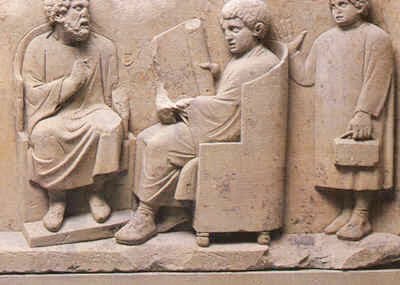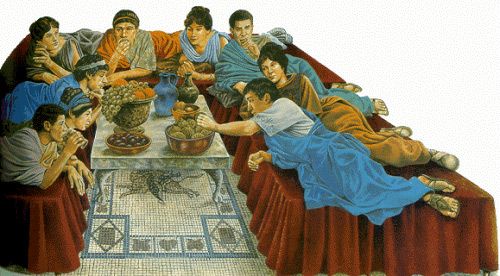Chapters
While reading (or watching) the adventures of Asterix, you must have come across Obelix’s statement: “But those Romans are stupid”. It turns out, however, that the Romans weren’t so stupid after all. Their everyday life may surprise us sometimes, but when you look closely… they are not so distant for us.
Religion
We know from history lessons that the Romans worshipped many gods, and that was how it was supposed to be until the proclamation of Christianity by Constantine the Great. Meanwhile, it is not mentioned that as early as 274 CE, Emperor Aurelian began to overshadow the gods. He placed particular emphasis on the worship of one deity – Sol Invictus, that is, the Invincible Sun. Interestingly, the most important holiday in honour of the deity was… December 25. It was the Day of the Invincible Sun’s Birth.
Apartments
The Romans had to obey many housing laws. Whether in the villas of the rich or in the small apartments of the poor, there was a strict ban on cooking. There was a fire hazard. Therefore, food could be bought ready-made or eaten “out in the city”. Alternatively, the room that served as the kitchen had to be separated from the rest of the house. Additionally, for sanitary reasons, the latrines were located at a distance from the house. Due to the danger of the building collapsing, it was forbidden to build houses higher than 17 meters under Hadrian.
Underwear
The Romans invented underwear. Both men and women wore subligaculum under their tunics. It was a material that resembled shorts. Women sometimes also wore “bras” – cloth bands on the chest. Both slaves and rich men wore underwear. It was obligatory for gladiators, athletes and actors.
Education
Education was an important stage in the life of every Roman. The sons of wealthy citizens had private teachers, the slightly worse off went to some kind of public school. Although education opportunities were unavailable to the poor, we know of many cases where even representatives of the lowest social classes tried to acquire at least the ability to read and write. An interesting fact is the lack of a grading system in Roman schools. Good results were not rewarded, but bad results were punished. Bad students were most often flogged.
Meals
As you can easily guess, poor Romans often ate what they managed to get. But the meals of the rich are described in great detail. The Romans ate four times a day, their first meal was ientaculum – usually eaten in the bedroom. This peculiar breakfast consisted of pieces of bread or cake, fruit and honey. Sometimes there was wine to drink. The next meal served in the morning was pradinum. The pradinum consisted of a light meal of bread, cheese, and sometimes meat. The most important meal of the day was the price, which was eaten in the late afternoon or early evening. If it was eaten with loved ones, in the absence of a special occasion, it lasted about an hour. If guests were received – even four. Here, the set of dishes was very varied, depending on the group of eaters. Before going to bed, sometimes a light supper consisting of bread or fruit was sometimes eaten.
Dogs
The Romans kept dogs in their homes. They served not only as pets but also for protection. During excavations carried out in the area of the former empire, peculiar signs warning against a dangerous animal are often discovered – these were mosaics depicting a dangerous quadruped and the inscription: “Cave canem”, which simply meant: “Beware, bad dog”.
Pecunia non olet
We are all familiar with this saying, the meaning of which is “money doesn’t stink.” But do you know where it came from? It all started with urine, which was a valuable resource for the Romans. Urine was used to tan leather, whiten clothes and even teeth. Urine as a valuable raw material was naturally taxed, its collection and processing brought the state a lot of income. Once upon a time, Titus, the son of Emperor Vespasian, pointed out to his father that the empire earned a disgusting tax. Then he heard this famous sentence from his father.
Latin
Although every text in Latin sounds dignified, it must be said openly that the Romans knew a lot of profanity and used them willingly. And it is not about the Latin word for “curve”, which is why we call profanity “Latin”. In real, ancient Latin, one could find numerous profanities relating to sexual activities. Who would have thought that distinguished Romans in togas loved lyrics such as the famous piece by Catullus, entitled: “Pedicabo vos et irrumabo…”.













